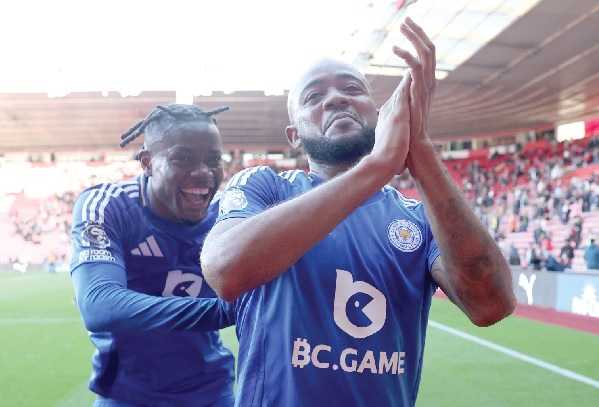
Leicester City’s relegation blues: Ayew, Fatawu face uncertain future amid salary cuts
The Foxes, once darlings of the English game following their fairytale title triumph in 2016, will now compete in the EFL Championship next season after managing just four league wins all year.
Trent Alexander-Arnold’s second-half strike at the King Power Stadium delivered the final blow, confirming Leicester’s descent after a chaotic and underwhelming campaign marked by two managerial sackings, off-pitch controversies, and record-breaking home goal droughts.
But beyond the heartbreak lies a financial reckoning—and it is the players who will bear the brunt.
With a wage bill exceeding €78 million and revenues expected to drop by at least two-thirds despite parachute payments, Leicester are now staring at a major cost-cutting exercise.
Among the names in the spotlight are Jordan Ayew and Abdul-Fatawu Issahaku, whose futures are suddenly uncertain amid the club’s rapid decline.
Ghanaians in the storm
Jordan Ayew, who joined Leicester from Crystal Palace on improved terms, is now the 16th highest-paid player at the club, earning €1.87 million annually, over €300,000 more than his last salary in South London. Among non-European players, only Wilfred Ndidi and Patson Daka earn more.
Meanwhile, Abdul Issahaku, who arrived permanently from Sporting CP for €14 million earlier in the season, earns significantly less—€625,668 per year.
His first full campaign in England was derailed by an ACL injury in November, making his Premier League stint a bitter introduction to the harsh realities of English football.
The relegation has been particularly cruel for Ayew, who now holds the unwanted record of becoming the first Ghanaian to suffer relegation from the Premier League on three separate occasions.
Issahaku, still only 20, must now grapple with the psychological and career consequences of a season gone awry—his first experience of such a major professional setback.
Club in freefall
Leicester’s fall from grace has been as swift as it has been dramatic. Just last season, they lifted the championship title and looked poised for a period of consolidation under Enzo Maresca. Instead, what followed was a shambolic campaign that exposed deep fissures in the club’s structure.
Steve Cooper, Maresca’s successor, was dismissed in October after failing to replicate his predecessor’s controlled approach.
His inability to command the dressing room despite backing from senior figures like Jamie Vardy left the team rudderless.
The appointment of Ruud van Nistelrooy, backed by assistant Brian Barry-Murphy, briefly lifted spirits following a win against West Ham and a draw at Brighton. But that early bounce soon faded.
Under the Dutchman, Leicester scored just six league goals since early December, and the club equalled a record eight consecutive defeats.
Van Nistelrooy, despite his legendary status as a striker, could not inspire an attacking revival.
His tenure became defined by tactical confusion and diminishing morale.
The numbers paint a grim picture: 23 league defeats, nine consecutive home games without a goal—an unwanted Premier League record—and growing unrest in the stands and boardroom alike.
Fan protests, legal wrangling, and the perception of a complacent playing group have all fuelled the narrative of a club in disarray.
Financial fallout
The implications of relegation go far beyond pride and reputation. Leicester’s finances are now under severe pressure.
Despite parachute payments—55 per cent of Premier League central distribution in year one, 45 per cent in year two, and 20 per cent in year three—revenues are projected to decline by around 66 per cent.
Moreover, insiders suggest the club has already borrowed against those future parachute payments, meaning the money will not be directly available to stabilise operations but will instead service existing debt obligations.
That leaves Leicester with serious cashflow challenges, especially as they attempt to restructure a squad that reportedly cost over £400 million to assemble.
Leicester face a painful period of belt-tightening. The squad, once considered Premier League calibre, now appears overpriced and under-motivated.
Leicester City’s wage bill for the 2024/25 season stands at a hefty €78.7 million, an unsustainable figure in the Championship.
England striker Jamie Vardy tops the list with a staggering €8.76 million annual pay packet, while Ayew is 16th on the earnings chart, alongside James Justin.
Among non-European players, Ayew ranks third behind Nigeria’s Wilfred Ndidi and Zambia’s Patson Daka, both on €4.69 million annually. By contrast, Issahaku’s salary — €625,668 — is three times less than Ayew’s.
Eight players are out of contract, and club insiders admit that high earners will be sold or asked to take significant pay cuts to avoid breaching sustainability rules in the Championship. Ayew and Issahaku — though at different ends of the pay scale—could both see their salaries slashed as part of a broad austerity plan.
The club’s lavish £100 million training complex, nicknamed the “Seagrave Holiday Hotel and Spa” by fans, is symbolic of Leicester’s excesses.
One player even likened it to “Centre Parcs”, underlining the perception that the squad had grown too comfortable.
Imminent rebuilding
For Ayew, whose market value has dropped from €10 million in 2020 to €4 million in 2024, the path forward is unclear.
Once a stalwart for Crystal Palace, his recent form and Leicester’s predicament could see him either transferred or offered reduced terms.
Issahaku, still young and full of promise, may attract suitors from abroad, but any departure would likely come at a financial loss for the Foxes.
For Ghanaian football, the relegations of Ayew, Issahaku, and Southampton’s Kamaldeen Sulemana are a blow to its Premier League footprint.
With fewer Black Stars in the top tier, the profile and visibility of Ghanaian players could wane, just as the national team seeks a new generation of global stars.
As Leicester prepare for life in the Championship, there are more questions than answers. Can they bounce back quickly like Burnley, or will they slide further into the financial abyss like Sunderland?
For now, all eyes remain on the club’s next moves—whether high-profile players such as Ayew and Issahaku will be part of the rebuild or become casualties of an era gone wrong.